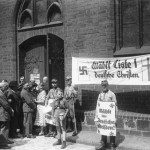In the long history of conflict between “Islam and Christendom,” there have been many flashpoints. The Battle of Poitier (732), the fall of Constantinople (1453), and the Battle of Lepanto (1571) are three notable examples from the premodern era. Well before the conflicts and confusions of our own time, the modern age witnessed its own share of flashpoints. I have been reading about some of them in Andrew Wheatcroft’s engaging Infidels: A History of the Conflict between Christendom and Islam, a survey Christian-Muslim tensions from the time of Islam’s birth until the twentieth century. Wheatcroft writes well and has knack for the revealing anecdote.
I’ve been particularly intrigued by the “Bulgarian Horrors” of 1876, a massacre of Bulgarians by Ottoman Turks, a key event that led to the Russo-Turkish War in 1877-78—one of those conflicts buried in the sands of time for most people. In April of 1876, an uprising fomented by the Bulgarian Revolutionary Central Committee, inspired by an insurrection in Bosnia and Herzegovina the previous year, set in motion a series of fateful events. The revolt took place mostly in the region of Plodiv, certain districts in northern Bulgaria, Macedonia, and in the area of Silven. The uprising was brutally crushed by the Ottomans who brought irregular Ottoman troops from outside the area. Many villages were pillaged and over 10,000 people were massacred, often in a grizzly manner.
The massacres aroused broad public reaction in Europe led by Britain’s liberal, devoutly Anglican Prime Minister William Ewart Gladstone, who launched a campaign against the “Bulgarian Horrors.” Indeed, his tract, Bulgarian Horrors and the Question of the East became an international sensation, selling over 100,000 copies. In it, he enflamed anti-Muslim sentiment throughout Europe by interpreting the particular event as indictment of Islam in general. “Wherever they [the Ottomans] went, a broad line of blood marked the track behind them, and as far as their dominion reached, civilization vanished from view.” This was not a novel view for Gladstone. Earlier, in 1859, on the only trip that he made to the Ottoman Empire, he recorded in his diary: “The whole impressions are most saddening; it is all, all, indolence, stagnation; the image of God seems as if it were nowhere.” To be sure, Muslim travelers to Europe often had comparably negative things to say.
Eventually, Russia intervened militarily on behalf of their fellow Slavs, the Bulgarians, and this in turn awakened-Russian sentiment in the West to sit next to anti-Ottoman sentiment. The intervention proved decisive, though, for the conflict resulted in establishing Bulgarian independence from the Ottoman Empire—an outcome ratified in the Treaty of Berlin (1878).
Much else could be said about this fascinating and revealing period. Reading about today in light events in the Balkans in the last few decades, one is led to the melancholy conclusion: plus ça change, plus c’est la même chose.













